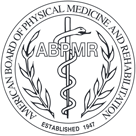American Board of Physical Medicine and Rehabilitation

Physical Medicine and Rehabilitation
A specialist in Physical Medicine and Rehabilitation, also called a physiatrist, evaluates and treats patients with disorders or disabilities in the muscles, bones, and nervous system, including neck or back pain, sports and work injuries, stroke, brain injury, spinal cord injury, spasticity, and any other disability or disorder that affects function. A physiatrist may lead a team of medical professionals to help patients improve their physical, psychological, social, and vocational function, and are dedicated to the whole person, including treating pain, restoring function, and improving quality of life. Treatment modalities may include medications, injections, therapeutic exercise, electrodiagnosis, and any equipment required for daily activities.
Contact the board to learn about specialty and subspecialty certification requirements.
Subspecialties
Brain Injury Medicine
A physiatrist who specializes in Brain Injury Medicine focuses on the prevention of brain injury as well as the evaluation, treatment and rehabilitation of individuals aged 15 or older with acquired brain injury. This specialist addresses a range of injury-related disorders that have psychosocial, educational, and vocational consequences, as well as related injuries of the central nervous system. He or she also works with an interdisciplinary team to facilitate recovery and improve patients’ health and function.
Neuromuscular Medicine
A physiatrist who specializes in Neuromuscular Medicine focuses on the evaluation and treatment of disorders of nerve, muscle, or neuromuscular junction, including amyotrophic lateral sclerosis (ALS), peripheral neuropathies (e.g., diabetic), various muscular dystrophies, congenital and acquired myopathies, inflammatory myopathies (e.g., polymyositis), and neuromuscular transmission disorders (e.g., myasthenia gravis).
Pain Medicine
A physiatrist who specializes in Pain Medicine diagnoses and treats patients experiencing problems with acute or chronic pain, or pain related to cancer, in both hospital and outpatient settings and coordinates patient care needs with other specialists.
Pediatric Rehabilitation Medicine
A physiatrist who specializes in Pediatric Rehabilitation Medicine diagnoses and manages congenital and childhood-onset impairments and disability such as cerebral palsy, spina bifida, acquired brain or spinal cord injury, amputation, sports injuries, and muscle and nerve diseases. This specialist works with an interdisciplinary team to improve a child’s mobility and daily function at home, in the community, and at school by prescribing equipment and therapies and managing medical conditions such as spasticity, pain, bladder or bowel dysfunction, and nutrition.
Spinal Cord Injury Medicine
A physiatrist who specializes in Spinal Cord Injury Medicine evaluates and manages patients with spinal cord injuries caused by trauma or from medical conditions such as multiple sclerosis, Guillain Barré syndrome, arthritis, infection, transverse myelitis, cancer, and spina bifida. This specialist works with an interdisciplinary team and prescribes equipment and therapies to enhance mobility and self-care skills; manages medical conditions such as pressure ulcers, pain, spasticity, bladder and bowel dysfunction, respiratory health, and mood disorders; and works to help patients return to their communities and vocations.
Sports Medicine
A physiatrist who specializes in Sports Medicine focuses on the prevention, diagnosis, and treatment of injuries related to participating in sports and exercise. This specialist also treats illnesses and diseases that might have effects on health and physical performance.
